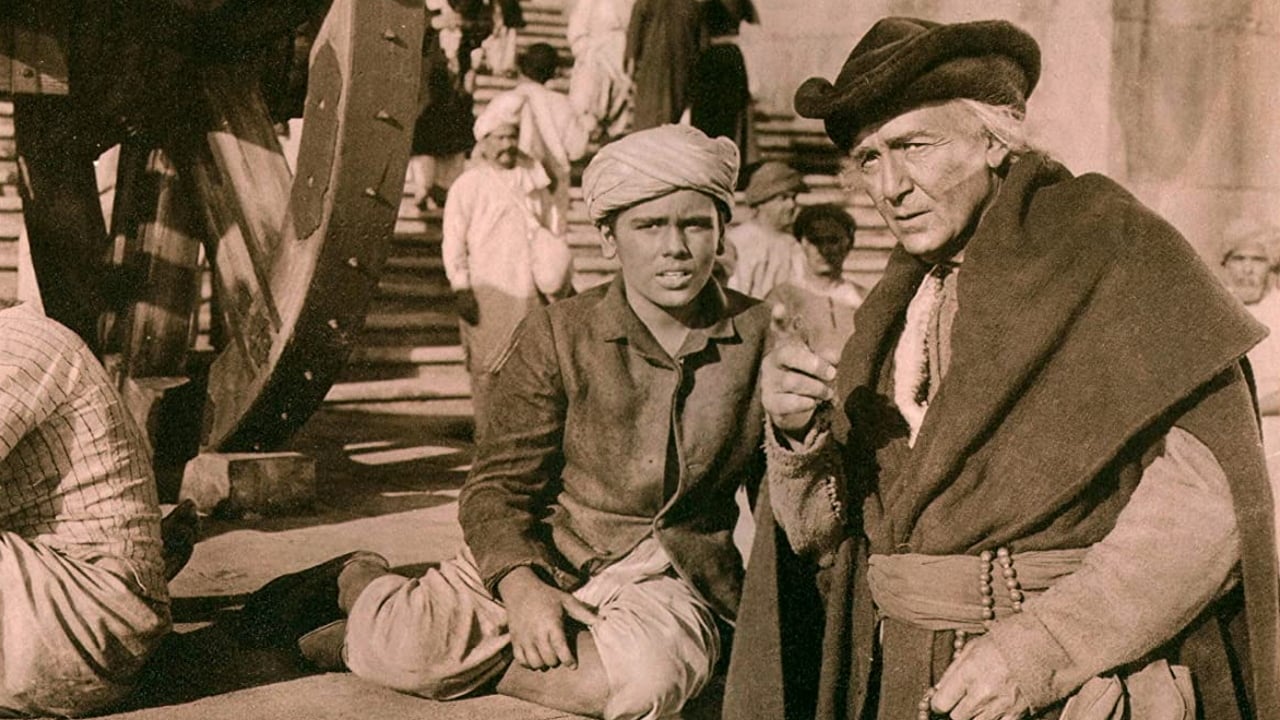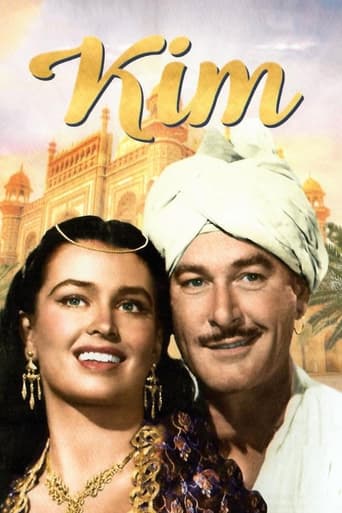

Such a frustrating disappointment
... View Moreridiculous rating
... View MoreThe performances transcend the film's tropes, grounding it in characters that feel more complete than this subgenre often produces.
... View MoreGreat movie. Not sure what people expected but I found it highly entertaining.
... View MoreThis film never fails to interest and please me no matter how many times I see it. Flynn was in the last stages of his career but his sheer presence and his charm are undeniable. He was born to play costume roles, woo women, ride horses and, if necessary, kill baddies. Dean Stockwell was a brilliant child actor. He was engaging but never cute. As Kim he is resourceful and cheeky but he is never superior to the adult world. Stockwell's Kim is visibly upset by violence and death. He is vulnerable and at times requires adult help. He is a boy in an adult situation and the adults are mostly in control. "Kim" was made at a time when most children aspired to be of help to the adult world rather than be the center of proceedings. The film captures Kipling's India. It is perhaps a sanitised and romanticised picture with India's rich colour and variety, human and natural, to the fore rather than true pictures of its overwhelming poverty and the oppressive domination by the British Empire. On the contrary, the British troops are seen as the heroes in "Kim". However, the film is really about being young and caught up in an adventure. It is about the thrill of being young and mentored by people you look up to as Kim looks up to Mahbub Ali and to the old Tibetan Lama.They can't and won't make them like this any more. But the past is sometimes a nice place to visit from time to time on a weekend afternoon with "Kim".
... View MoreThe film is named after a young boy (Dean Stockwell) in India who is an orphan and who has learned to use his wits to survive. He also knows that his father was in the Colonial Army and because of that, the lad has an affinity for working with his British overlords. And so, the boy becomes a spy for the British Army and eventually does his part to continue the British subjugation of the Indians. Well, that's not QUITE how Rudyard Kipling and the filmmakers saw it, but in essence it's a film advocating colonialism. All the anti-colonialists are bad in the film and the occupying forces (the Brits and their Indian allies) are good."Kim" is a fun and enjoyable story even if it promoted an over-idealized view of the British in India. HOWEVER, it's also incredibly stupid. While I could see that the 'Indians' in the film were about as Indian as a cannoli, my uncle happened to be visiting and he was REALLY put off by the film. After all, he'd spent some time in India and said that the film was nothing but a long series of silly clichés--and was like a film made by someone who knew next to nothing about the country. And, with white folks painted up to look like Indians, it's even more profoundly silly. I think if they remade the film with an actual Indian cast (when appropriate), the film could really work. Imagine...Errol Flynn as a red-bearded Indian!!! And, the Hungarian actor, Paul Lukas, as an Indian lama!! Uggh!
... View MoreA reviewer says that Kim is half Indian. That is not the case, he is wholly British.The ending of the Kipling's novel is ambiguous - does Kim go fully "native" and live an Indian spiritual life or does he become fully a Briton or does he continue moving to and fro in both worlds? The general feeling is that Kipling infers that he permanently becomes as an Indian. He remains a disciple of the Lama and continues on immersed in a spiritual life on the lama's death. There is a great opportunity for a sequel here, both as a novel and as a film.Generally the reviewers get it right. The movie is tedious and although much of the film was shot in India it fails to capture the excitement and action of India, especially when depicting life on the road, which is one of the most intriguing elements of the book.
... View More"Kim" is a Hollywood attempt at a literary adaptation that doesn't quite come off: on re-reading the book I was surprised at just how much is lifted directly from Kipling's original dialogue, albeit not always in the original context, and many of the familiar images are there even where the plot strands that were attached to them have been omitted. The little boys still ride astride the great gun in Lahore, the smashed water-jar reforms itself on the floor of Lurgan's shop, and the old woman from Kulu peeps shamelessly from the corner of her curtained cart.A great deal has been condensed in order to meet the requirements both of length and of the cinematic form; the most memorable parts of Kim's adventures, like those of Mowgli, occur before he is 'civilised', and the film does a good job of trying to reduce the strung-out remaining two thirds of the novel into a reasonably short timespan. Many of the added scenes, such as the one where Mahbub Ali cheerfully dispatches a would-be assassin and Kim tries for equal equanimity but fails, Creighton's device for helping Kim escape his pursuers at Ambala, and the boy's hard bargaining with the disguised goat-herd in the mountains, are true to the spirit of the book. Someone clearly did try hard on this.But what I would guess that MGM were hoping for was another Kipling-cribbed adventure story along the lines of "Gunga Din", and "Kim" simply doesn't come to life in the same manner. British-made films of India such as "The Drum" or "North West Frontier" capture the local colour better, but they also have the advantage of more sophisticated political dialogue and a more inherently cinematic plot. Ironically, "Kim" probably sticks too close to source: Kipling's novel was never intended as a conventional thriller, and once you take out the philosophy, description and the unequalled ear for the demotic that conjure up the author's India at such length, there isn't that much actual action in the book. The screenplay supplies some extra thrills to take the place of the novel's ignominiously simple defeat of the Russians and adds a couple of rooftop chases earlier on, with the somewhat creaky device of a narrator used to fill in the gaps, but it didn't really catch my imagination.Dean Stockwell is no Sabu, but he acquits himself well in a film that absolutely depends on its central child actor. He handles Kim's long streams of abuse or cajolery with aplomb, and looks if anything more convincing in Indian clothes than European costume, where he seems more the 1950s schoolboy than a child of the nineteenth century.Casting Errol Flynn as Mahbub Ali, the Afghan horse-trader 'as prompt as he was unscrupulous', was clearly a publicity coup for MGM, who awarded him top billing for what is really only a supporting role, and rewrote the story to give the character a more heroic place in the action. For his part, Flynn sacrifices not only his trademark pencil moustache, but his entire head of hair to the studio, appearing at one point with a shaven scalp and at another with a bizarre ginger stubble that suggests someone had misunderstood the concept of a crimson-dyed beard... He wears his costumes well, and the script adds in a couple of winking nudges to Flynn's image as a screen Lothario that aren't really an improvement; but on the whole he plays it straight, although relatively uninspired. There's nothing wrong with the performance but nothing really memorable about it either, although there is a visible rapport between Mahbub and the boy.Paul Lukas gives a good performance as the holy man whom Kim loves and protects, once you've got over the fact that he looks nothing whatsoever like a Buddhist monk -- more like an elderly Cardinal! The fact that he is supposed to be Tibetan is perhaps wisely glossed over in the script, and Lukas brings out the quiet steel behind the old man's unworldly determination, as well as his affection for Kim.Ultimately, however, I felt this film neither had the depth of character of its source nor the magic and excitement of the type of adventure it's trying to be; it reads as a tea-time adaptation rather than a film in its own right. I'd rank it as a 7 on my personal scale: worth recommending if it's on, but not worth going out of one's way to see.
... View More